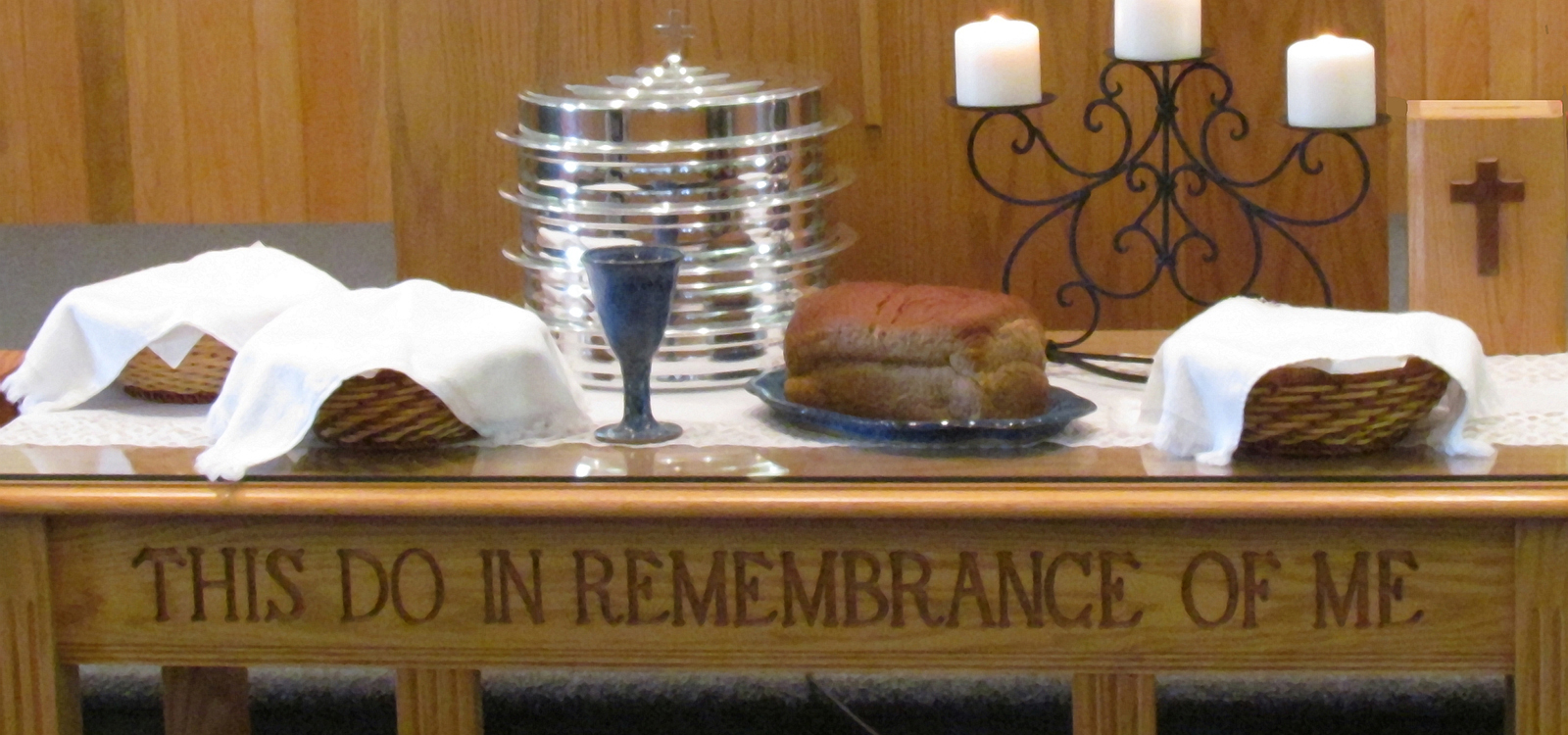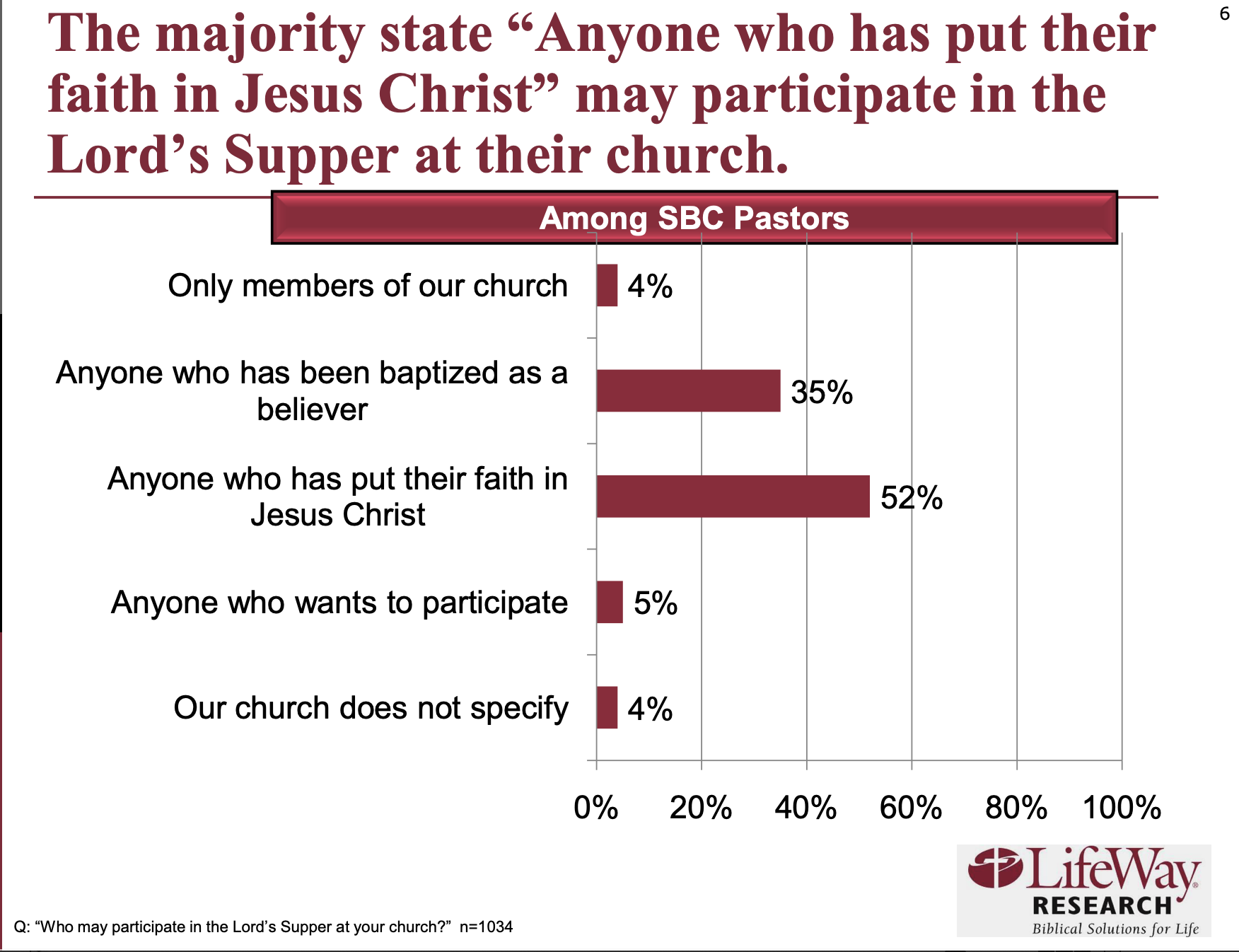Those currently calling for the Southern Baptist Convention to expel any church with a woman carrying the title “pastor” appeal to two primary sources — beyond their own biblical interpretation — as justification: The Baptist Faith and Message doctrinal statement and resolutions adopted at SBC annual meetings.
Not all parts of the Baptist Faith and Message and past convention resolutions carry the same urgency, however.
There is no similar effort to expel churches that welcome unbaptized believers to partake in the Lord’s Supper. There is no similar effort to expel churches that welcome into their membership people who have not been baptized by immersion. And there is no penalty for churches or pastors who support “immoral” and “lawless” politicians.
Yet all these issues are strongly addressed in either the Baptist Faith and Message or past resolutions.
‘Moral character of public officials’
It might come as a surprise to the majority of Southern Baptists whom polls indicate continue to support Donald Trump to know that in 1998, the SBC adopted a resolution titled “On Moral Character of Public Officials.”
It noted that “serious allegations continue to be made about moral and legal misconduct by certain public officials” and that “governing authorities are not themselves exempt from the rule of law and must submit to the nation’s statutes, rather than mocking them.”

Bill Clinton
The resolution lamented that “journalists report that many Americans are willing to excuse or overlook immoral or illegal conduct by unrepentant public officials so long as economic prosperity prevails.” And that “tolerance of serious wrong by leaders sears the conscience of the culture, spawns unrestrained immorality and lawlessness in the society, and surely results in God’s judgment.”
It concluded that “moral character matters to God and should matter to all citizens, especially God’s people, when choosing public leaders” and that Southern Baptists ought “to elect those officials and candidates who, although imperfect, demonstrate consistent honesty, moral purity and the highest character.”
“Moral character matters to God and should matter to all citizens, especially God’s people, when choosing public leaders.”
Was this a prescient forecast of why citizens shouldn’t vote for Donald J. Trump, a known adulterer and liar? No, it was a resolution aimed at then-President Bill Clinton — a Southern Baptist — who was embroiled in scandal over his relationship with White House intern Monica Lewinsky.
Two decades later, this resolution and commitment to “moral” leaders was nowhere to be found as the conservative evangelical base that includes Southern Baptists stuck closer than a brother to Trump, even in adversity.
There has been no call to discipline denominational leaders — such as Al Mohler of Southern Baptist Theological Seminary — for publicly endorsing Trump while acknowledging his immorality. There has been no effort to expel First Baptist Church of Dallas or Prestonwood Baptist Church of Plano, Texas, despite their high-profile pastors serving on Trump’s religious advisory board and portraying him as God’s best plan for American leadership.
Church membership
While the current debate over women involves which churches may be members of the SBC, there’s a related downline question: Who may be a member of a Southern Baptist church?
Article VI of the Baptist Faith and Message explains: “A New Testament church of the Lord Jesus Christ is an autonomous local congregation of baptized believers, associated by covenant in the faith and fellowship of the gospel.”
That definition, of course, requires a further definition of the word “baptized.”
“Christian baptism is … prerequisite to the privileges of church membership and to the Lord’s Supper.”
Article VII of the Baptist Faith and Message clarifies: “Christian baptism is the immersion of a believer in water in the name of the Father, the Son and the Holy Spirit. … Being a church ordinance, it is prerequisite to the privileges of church membership and to the Lord’s Supper.”
Official SBC doctrine is that baptism by immersion as a believer is a prerequisite to membership in a local church. And that has been the norm for decades — although with notable and increasing exceptions.

Bobby Jaimeson
In 2015, The Gospel Coalition — a conservative, Reformed-oriented network — published an interview with then Ph.D. student Bobby Jamieson about his book Going Public: Why Baptism Is Required for Church Membership, which was published by an SBC imprint, B&H Academic.
Jamieson, who now serves on staff at Capitol Hill Baptist Church in Washington, D.C., argues for what’s known as “closed membership.” That means there must be specific limits — including believer’s baptism — on who can be a member of a Baptist church. His position directly parallels the statement in the Baptist Faith and Message.
“Baptism is like a jersey that shows you’re now playing for Jesus’ team,” Jamieson said. “A church may publicly identify itself only with those who have publicly identified with Jesus in baptism.”
This interview happened as influential Baptist pastor John Piper (not a Southern Baptist) and others were advocating more open membership policies so as not to deny anyone who believes in Jesus membership in Christ’s church.
What once was a standard-issue doctrine for SBC churches has come under practical pressure from both the right and left as denominational lines are giving way to Christians moving from church to church. No longer do all SBC churches require someone baptized as an infant in a Presbyterian or Methodist church to be rebaptized by immersion to join the Baptist church — even though that is the official stance and longstanding practice of SBC churches.
Modern churchgoers are simply more mobile than ever before — often choosing churches based on location, theology, preaching or worship rather than label.
And there are cases where individuals profess faith in Christ but, for a variety of reasons, have not been baptized at all.
This dilemma was addressed in a 2008 SBC resolution on church discipline that said, in part: “We urge the churches of the Southern Baptist Convention to repent of the failure among us to live up to our professed commitment to regenerate church membership and any failure to obey Jesus Christ in the practice of lovingly correcting wayward church members.”
“Regenerate church membership” is Baptist-talk for church membership comprised only of those believers who have been baptized by their own will and by immersion.
“A church is not at liberty to allow individual Christians to determine what baptism means and whether they have been baptized.”
Again, Jamieson echoes the traditional SBC line on this: “Baptism is something Jesus requires the church to do, not just individual Christians: an individual gets baptized, but the church baptizes. Therefore, a church is not at liberty to allow individual Christians to determine what baptism means and whether they have been baptized. Do we allow believers’ consciences to trump the church’s convictions in other areas of church-constituting doctrine and practice?”
Those “other areas of … doctrine and practice” brings the thread back to ordination and the definition of the word “pastor” — both clear examples of doctrine and practice.

(shutterstock)
The Lord’s Supper
Closely connected to the doctrine of baptism is what other Christian traditions commonly call “Communion.” In Baptist life this is most often called the “Lord’s Supper.” That’s due, in part, to differences in theology about what the bread and wine (or in the case of Baptists, grape juice) represent. Southern Baptists view the Lord’s Supper as an “ordinance” of the church, along with baptism, meaning these are things Jesus commanded the church to do.
While Baptists do not believe the bread and cup transform into the literal body and blood of Christ — as in Catholicism — the Lord’s Supper carries significant weight as an important act of worship.
But in most Baptist belief, the Lord’s Supper is not open to just anyone wandering by. It is intended for baptized believers.
Article VII of the Baptist Faith and Message states: “The Lord’s Supper is a symbolic act of obedience whereby members of the church, through partaking of the bread and the fruit of the vine, memorialize the death of the Redeemer and anticipate his second coming.”
This SBC doctrine relies on an understanding of the definition of “members” as noted earlier. If all church members are required to be those who have professed faith in Jesus and been baptized or their own volition by immersion, the same requirement would apply to those eligible to partake in the Lord’s Supper.
As a side note, there was a mid-19th and early 20th century variation on this issue called Landmarkism. Landmarkers taught that only baptized members of that particular local church were allowed to partake in the Lord’s Supper in that church. This view is seldom held today, although its influences lingered well into the mid-20th century.
In Baptist vocabulary, these distinctions are known as “closed communion” and “open communion.” There are varying points along a continuum between “closed” and “open,” however, ranging for the Landmarkist view on the far closed side and to anybody is welcome on the far open side. Practically, many Baptist churches today practice some form of unpoliced open communion, usually declaring the Lord’s Table open to all “baptized believers.”
 While there is no recently published research on what SBC churches are doing with their membership policies, there has been research on the Lord’s Supper. A decade ago, the SBC-affiliated Lifeway Research issued a report on the Lord’s Supper practices of Southern Baptist churches.
While there is no recently published research on what SBC churches are doing with their membership policies, there has been research on the Lord’s Supper. A decade ago, the SBC-affiliated Lifeway Research issued a report on the Lord’s Supper practices of Southern Baptist churches.
According to the Lifeway survey, 52% of SBC churches said they offer the Lord’s Supper to “anyone who has put their faith in Jesus Christ.” Another 35% said “anyone who has been baptized as a believer” may participate. Only 5% of churches serve the Lord’s Supper to “anyone who wants to participate,” while 4% of churches said they don’t specify any conditions for participation and another 4% said they hold the Landmark view of totally “closed” communion.
“Clearly … this survey points out a difference between the beliefs expressed in the Baptist Faith and Message and the Lord’s Supper practices of many Southern Baptist churches,” said Scott McConnell, director of Lifeway Research.
Thus, while an appeal to past SBC resolutions and the Baptist Faith and Message might be a convenient benchmark for those seeking to limit what autonomous Baptist churches call their staff members, it could be a dangerous road to enter.
The same arguments could be used to remove more than half the SBC’s churches and some of its most prominent Trump-supporting pastors.
Related articles:
Southern Baptist Convention ousts its largest church, Saddleback, for having a woman pastor
Seminary president says Southern Baptists drifting toward infant baptism
Baptism — essential sacrament or symbolic ordinance? | Analysis by Karen Bullock


